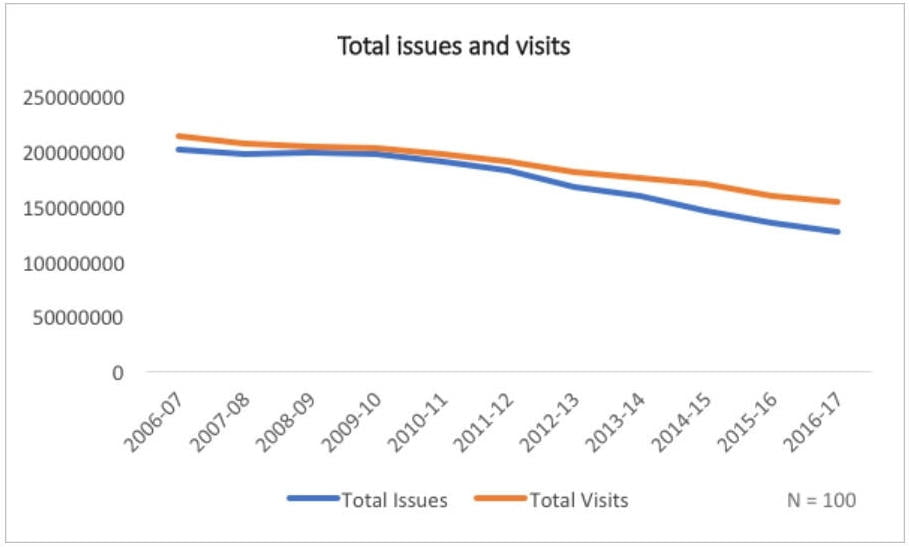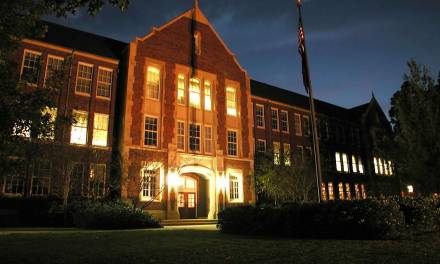With the advances in technology and the capabilities that the internet has introduced, many traditional learning tools and resources have started to decrease in popularity.
As students prefer to do online research from the comfort of their room, there is a noticeable difference in approach to studying and research methods compared to 20 years ago.
Back then, a trip to the library would be a regular routine for students looking to find journals and other educational resources to help them to complete assignments.
Statistics shared on the government website show ten years of continual decline in library usage, as shown in the graph below:
Libraries have been such a fundamental part of education and the history of Britain, so it is a great concern to see library usage declining so rapidly.
Both national and local campaigns have been taking place to ‘save our libraries’, such as The Library Campaign but to stop the trend of declined use, more must be done.
Schools and teachers can play a crucial part in encouraging students to use local libraries and these strategies should help:
1. Set up reading challenges
Many children are motivated by a bit of competition, especially if there is a reward or recognition of some kind involved.
There are many different types of reading competitions from ’16 Before 16′ a competition to read 16 selected classics before they turn 16, to fancy dress competitions to celebrate National Book Day.
This article in The Guardian looks at a few different challenges including the 100 Word Challenge created by Julia Skinner.
2. Organise a field trip to the local library
If there is one sure way to get students excited about something, it is the promise of time out of school!
If you organise a field trip to the local library, it not only motivates them through being out of school, it also gives you the chance to introduce students to libraries when they may never have been to one before.
Learning the way libraries work and how to use the resources, set up membership etc. can encourage them to use the free resources that they may not have been aware of.
3. Set homework that involves a visit to the local library
Google and Wikipedia may have the answer to most general questions but you could set homework assignments that must involve using the library.
This could be done by setting a test using answers that would only be revealed through a visit to the library i.e. questions available in archives and related to the books that are available.
4. Get students excited about library technology
Some libraries have some cutting-edge technology such as 3D design printing and some also have ‘Digital maker labs’ giving students the opportunity to try making something fun at the library.
You can find a full list of the libraries that offer maker spaces online.
Virtual reality is another exciting feature that some libraries host. Manchester Central Library, as an example, has a media lounge where people can use games consoles, iMacs and creative software such as Adobe Creative Suite.
5. Promote library groups and activities that might interest students
Students might not be aware of the range of different types of groups and activities that are available at libraries.
Reading groups are common at most libraries but there are many more activities that may be more appealing to students, such as coding clubs where they can learn the basics of coding. Film makers groups, games sessions, fun exhibitions and for the younger students, themed days are all groups that could garner interest.
You could promote the activities with posters around the school, or by using the school’s social media accounts to promote local library activities.
Changing the younger generation’s perceptions of libraries is a challenge but these strategies should definitely help the cause.
EDClass is a library that can be used at home
Realistically, not every student will want to attend their local library so alternatives need to be provided to expand their learning. The internet is arguably the most valuable resource at students’ fingertips and can be accessed anywhere.
EDClass can be used by students who struggle to make it into mainstream education and can include those who are medically sick and cannot physically access local libraries.
To book a free online demonstration of the platform then book here. Alternatively, you can call the team on 01909 568 338 or send an email to mail@edclass.com for more information.











